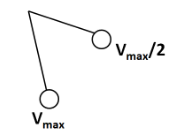Question
Question: A particle starts S.H.M. from the mean position as shown in the figure below. Its amplitude is \( A ...
A particle starts S.H.M. from the mean position as shown in the figure below. Its amplitude is A , its time period is T . At what displacement, its speed is half of its maximum speed?

(A) 23A
(B) 32A
(C) 32A
(D) 23A
Solution
Hint : To solve this question, we need to use the relation between the speed and the displacement of a particle performing S.H.M. On substituting the value of maximum speed in that formula, we will get the required displacement of the particle from the mean position.
Formula used: The formula used to solve this question is
v=ωA2−x2 , v is the speed, A is the amplitude, ω is the angular velocity, and x is the displacement of a particle performing S.H.M.
Complete step by step answer
Let the displacement be d of the particle from the mean position be at which its speed is half of its maximum.
We know that the speed and the displacement in the simple harmonic motion are related by the formula
v=ωA2−x2 (1)
We also know that the speed of the particle is maximum at the mean position. At the mean position its displacement is equal to zero. Therefore, substituting x=0 in (1) we get the maximum speed of the particle as
V0=ωA2−02
V0=ωA (2)
Now, according to the question, the speed of the particle is equal to the half of the maximum, that is,
v=2V0
From (2)
v=2ωA
Substituting this in (1) we get
2ωA=ωA2−x2
According to our assumption, x=d . Therefore
2ωA=ωA2−d2
Cancelling ω from both the sides, we have
2A=A2−d2
On squaring both the sides, we get
4A2=A2−d2
⇒d2=A2−4A2
Taking the LCM
d2=44A2−A2
⇒d2=43A2
Taking the square root both the sides, we finally get
d=23A
Thus, the displacement of the particle from the mean position, at which its speed is equal to the half of the maximum, is equal to 23A .
Hence, the correct answer is option A.
Note
While solving for the displacement, we will have one negative and one positive value. But we have only considered the positive root. This is because there were only positive displacements mentioned in the options. Also, the positive and negative sign of the displacement depends upon our choice.
